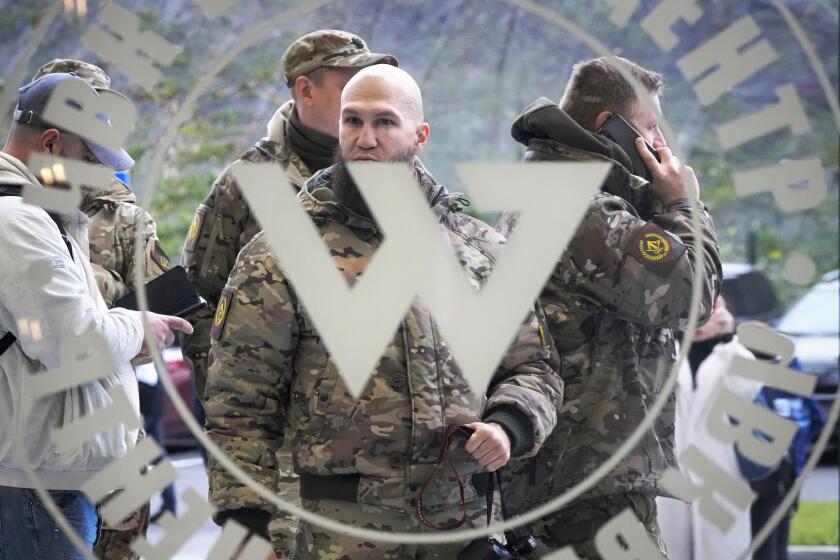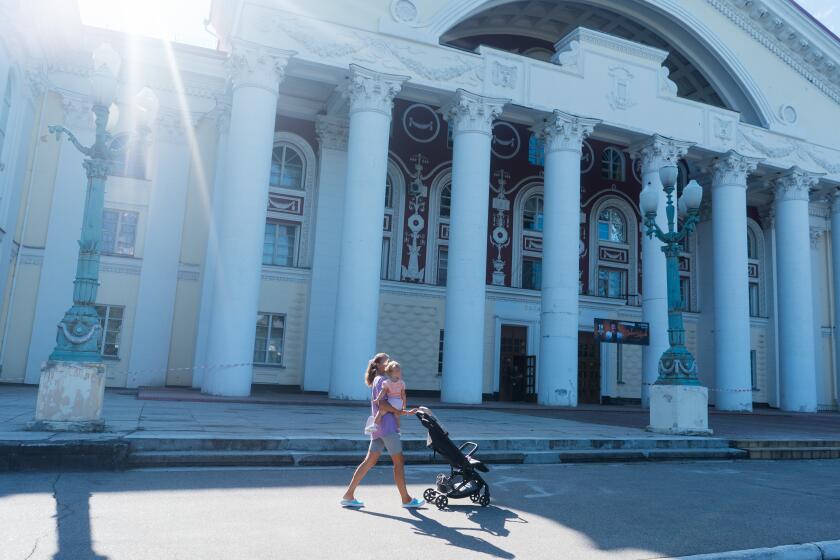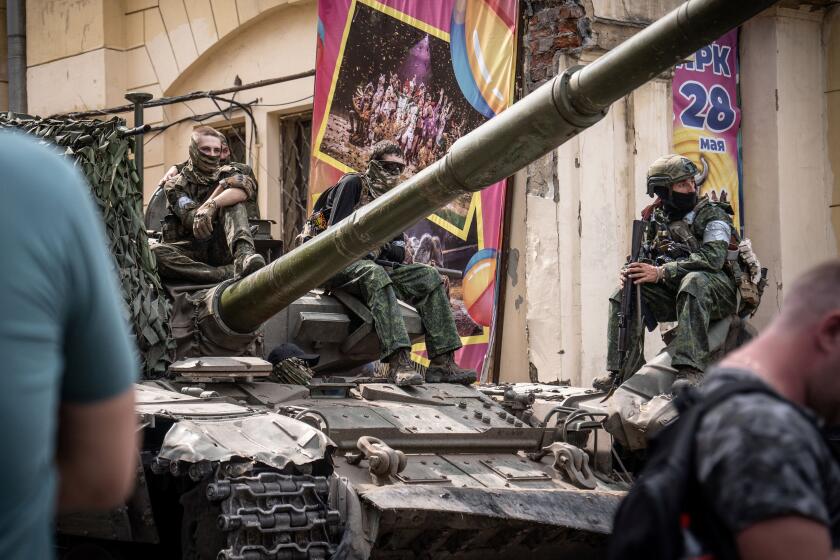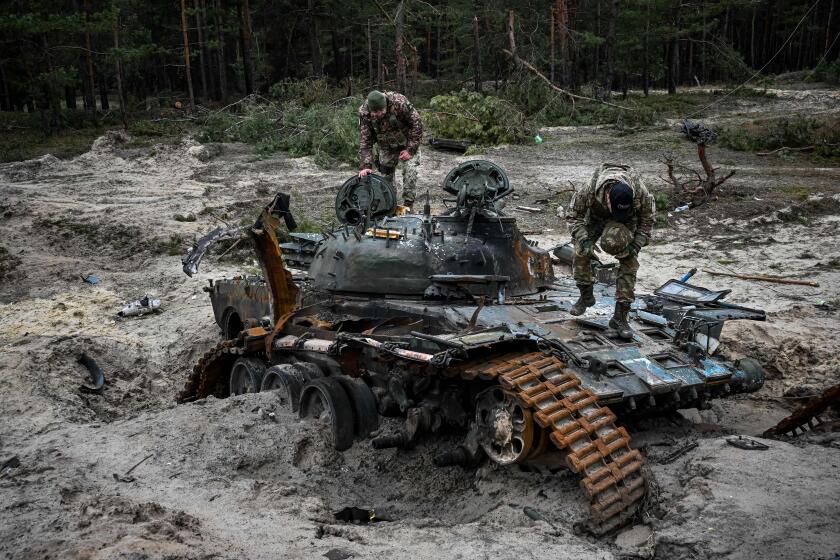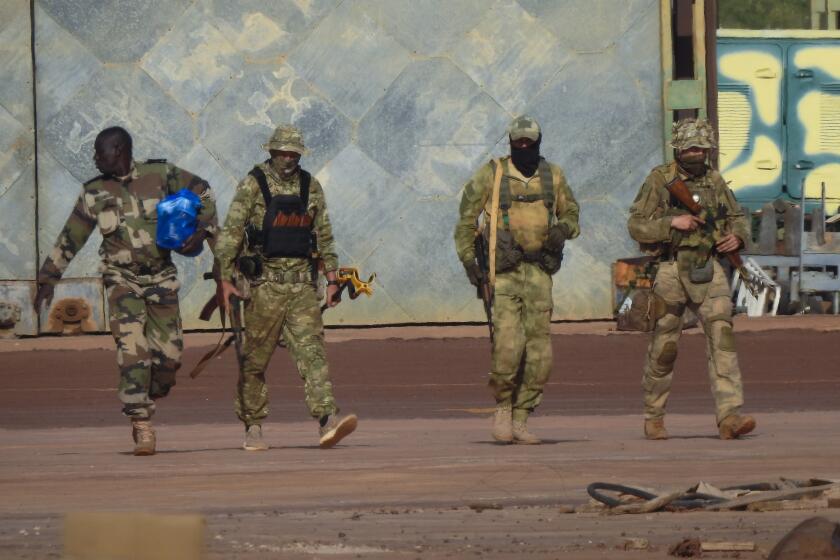Charred wreckage, burning questions after Putin calls Prigozhin a ‘man of complicated fate’
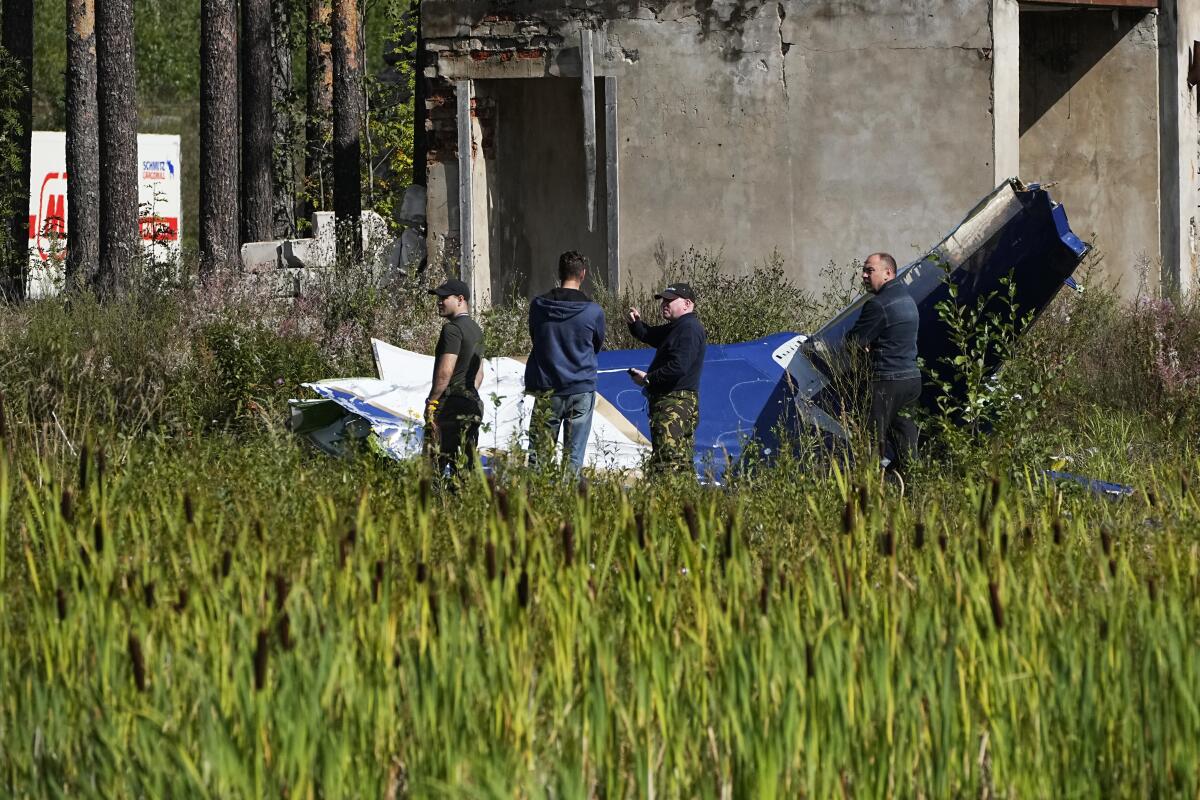
- Share via
Was mercenary warlord Yevgeny Prigozhin’s presumed death in a plane crash a form of fiery payback by Russian President Vladimir Putin?
And if it was, does it leave Putin stronger — or exacerbate the fundamental weaknesses laid bare by Prigozhin’s abortive mutiny two months earlier?
Those questions reverberated Thursday not only within Russia, but also in Ukraine, the sovereign neighboring country where Putin launched a full-scale invasion 18 months ago, and in Western capitals that have come to Ukraine’s aid as it struggles to regain territory seized by the invaders.
On Wednesday evening, residents near the Russian village of Kuzhenkino, northwest of Moscow, heard explosions in the sky, then watched the Embraer jet slam into the countryside and burst in flames. Russia’s aviation authority said soon afterward that Prigozhin was among the 10 people aboard.
A full 24 hours after the crash, Putin broke his silence over the episode, with state media reporting he offered condolences to families of the victims. In remarks reported by the state news agency Tass, he called the 62-year-old Prigozhin — head of the private army known as the Wagner Group — a “man of complicated fate” who made “serious mistakes in his life but achieved the right results.”
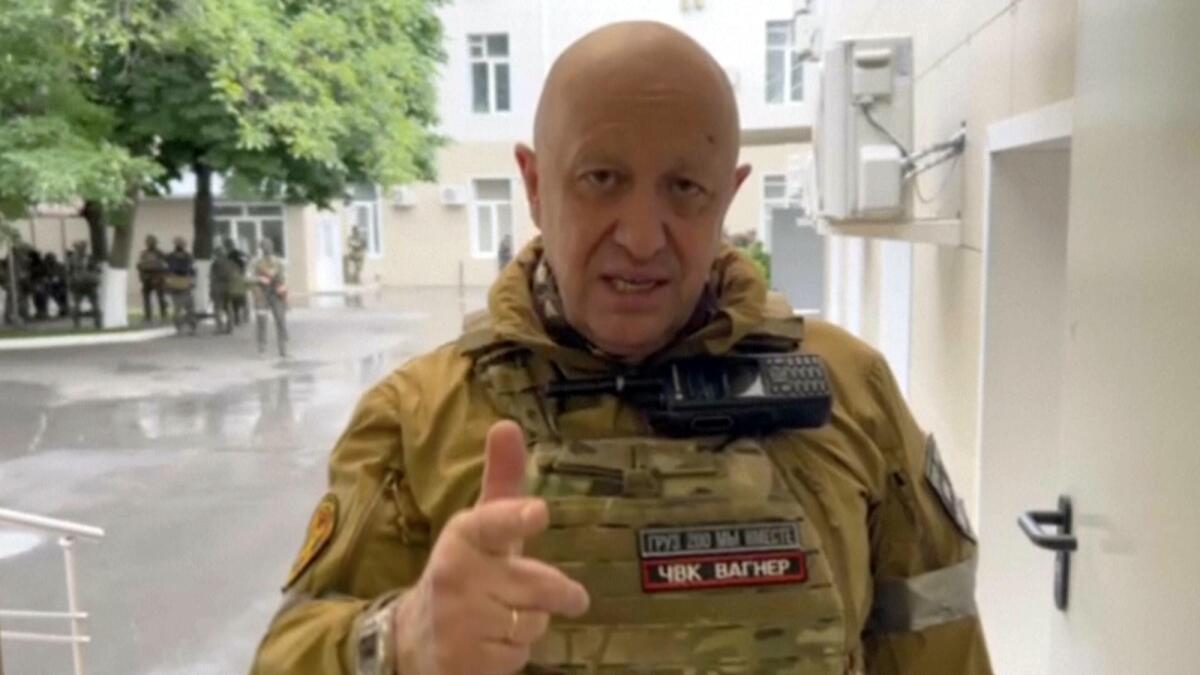
In the hours after the crash, Prigozhin’s backers had gathered in front of Wagner’s former headquarters in St. Petersburg, laying wreaths and flowers amid candles and fabric patches showing Wagner’s skull insignia.
Throughout the Ukraine invasion, Prigozhin had occupied the role of enfant terrible, regularly lambasting Russia’s military leadership — but never Putin himself — for what he said was incompetence in prosecuting the war. That antagonized the military brass, but his profanity-laced video tirades had nevertheless served as a sort of release valve for Russian hard-liners’ frustrations over the faltering offensive.
Russian private military contractor Wagner is busy boosting its brand as its fighters try to subdue Ukraine, trading secrecy for war propaganda movies.
Just what caused the crash remains a mystery. In Washington on Thursday, the Pentagon press secretary said reports that a surface-to-air missile downed Prigozhin’s plane were deemed inaccurate, but he would not elaborate. “Our initial assessment is that it is likely Prigozhin was killed,” Air Force Brig. Gen. Pat Ryder said at a briefing. Other U.S. officials who were not authorized to comment and spoke on condition of anonymity said one possibility was a bomb aboard the plane.
The timing alone of Prigozhin’s presumed death — two months to the day he launched his attempted uprising, seizing a southern military headquarters and sending an armored column marching toward Moscow — had raised suspicions of a Putin-orchestrated plot.
Perhaps, some analysts suggested, it marked the demise of a nettlesome character whose usefulness — as a deniable military asset, international fixer and pro-Kremlin master of the media dark arts — had run its course.
If Putin indeed ordered Prigozhin killed, the sheer brazenness of the act would probably deter would-be opponents, at least in the short term, said Andrea Kendall-Taylor, a Russia intelligence expert at the Center for a New American Security.
A Ukrainian city grapples over whether to rename its history museum, currently named after a great-uncle of warlord Yevgeny Prigozhin
“[The] thing that is so spectacular about this was that they didn’t need to use any cover of an accident or leave any uncertainty,” she said. “This was a clear demonstration to others who might consider challenging Putin of what kind of fate awaits them.”
But in an authoritarian state, tactics such as the assassination of political foes — if that was what transpired — is a long-term sign of a leader’s ebbing power and influence, some analysts said.
“Nobody knows what will come next in Putin’s Russia,” Brian Klaas, an associate professor in global politics at University College London, wrote on his Substack newsletter. “But anyone who thinks that killing a rival to reassert control is a show of strength, not weakness, is delusional. Strong leaders don’t need to kill their rivals, because they inspire loyalty instead.”
The prospect of a nuclear-armed superpower falling into disarray terrified neighboring countries throughout Europe and put the White House on alert.
Others saw a move by the Kremlin to shore up Putin’s authority.
“In the last two months, we saw the Kremlin machinery move to reconsolidate control. To my mind, it doesn’t say much about weakness or strength. Rather, it shows that the Kremlin machine can reconsolidate and reconstitute itself,” said Alina Polyakova, who heads the Center for European Policy Analysis. “The bottom line is that they’ve neutralized the threat.”
In Ukraine, President Volodymyr Zelensky made a thinly veiled jab at Putin but stopped short of accusing the Russian president of being behind the crash, even as he disavowed any Ukrainian involvement.
“We are not involved in this situation, that’s for sure,” Zelensky said at a news conference in Kyiv alongside the visiting Portuguese president. “I think everyone is aware of who is involved.”
As Zelensky spoke, Ukrainians commemorated their Independence Day, marking the country’s sovereignty that followed the breakup of the Soviet Union in 1991. But events were muted, coming amid a grinding counteroffensive that has exacted heavy casualties while resulting in mainly incremental territorial gains thus far. In Kyiv and other cities, air-raid alarms punctuated the day, as they routinely do.
The news that Prigozhin was believed dead surprised few Ukrainians out for the holiday, with many citing Putin’s reputation for ruthlessness and vengeance.
“It’s not time to celebrate yet,” said Oleksiy Hurobenko, 46, who had come to the Kyiv city center to walk around with his family. “It’s just too bad the whole country wasn’t on that plane.”
The Ukrainian military’s surrender hotline, dubbed ‘I Want to Live,’ is enticing some Russian soldiers to quit the battlefield as the war drags on.
On Kyiv’s main boulevard, onlookers strolled past a display of captured Russian tanks and military vehicles recovered from the eastern and southern battlefields. Many had been pulled from front-line areas where Ukraine has battled Wagner forces and Russian troops.
How the entire Prigozhin episode will affect Wagner, the lucrative private army that became the centerpiece of Prigozhin’s business empire, remains to be seen. But a glance at the names of those who were also believed aboard the fatal flight hints at a plan not just to decapitate the Wagner Group, but also to dismantle it altogether.
Also aboard the jet was Dmitry Utkin, the decorated, former special forces officer with Russia’s military intelligence service who was the mercenary group’s founder and spiritual father. His penchant for Nazi lore spurred him to choose the call sign “Wagner,” a reference to Richard Wagner, Hitler’s favorite composer, and the name was eventually adopted by the whole group. Another passenger was Valery Chekalov, who was reported to fill a senior position in Prigozhin’s holding company Concord and who owned a shell company on Prigozhin’s behalf.
“Utkin was responsible for all combat training and operations planning and had extremely high authority, while Chekalov was in charge of all logistics and supply routes for Wagner, from Syria to Venezuela, in addition to the security service,” said Anton Mardasov, a nonresident scholar at the Middle East Institute and the Russian International Affairs Council focusing on Wagner’s work in Syria.
Mardasov added that the deaths of those figures left Wagner with no real leader.
“Without them, no council of commanders for Wagner would be valid,” he said.
In the wake of the aborted coup attempt, Wagner’s presence in Ukraine was all but excised, but the forces nevertheless continued to operate in Africa, even doubling down on their presence in the continent.
Russia has engaged in under-the-radar military operations in at least half a dozen countries in Africa in the last five years using a shadowy mercenary force analysts say is loyal to President Vladimir Putin
Prigozhin’s last video appearance, which was presumably taken this week, showed him in what appeared to be somewhere in Africa, kitted out in military fatigues and an assault rifle.
“We’re working in over 122-degree temperatures here; it’s just how we like it,” he said, adding that Wagner was making “Russia greater in all the continents.”
Meanwhile, among Russia’s constellation of pro-war military bloggers, the apparent loss of Prigozhin was seen as a major blow.
Roman Saponkov, a military blogger close to Wagner, called it an “assassination” and said the death would have “catastrophic consequences.”
Writing on the Telegram messaging app, Saponkov declared that those “who gave the order do not understand the mood in the army and the morale at all.”
Bulos reported from Beirut and King from Washington. Staff writer Tracy Wilkinson in Washington and special correspondent Sabra Ayres in Kyiv contributed to this report.
- Share via
Watch L.A. Times Today at 7 p.m. on Spectrum News 1 on Channel 1 or live stream on the Spectrum News App. Palos Verdes Peninsula and Orange County viewers can watch on Cox Systems on channel 99.
More to Read
Sign up for Essential California
The most important California stories and recommendations in your inbox every morning.
You may occasionally receive promotional content from the Los Angeles Times.
